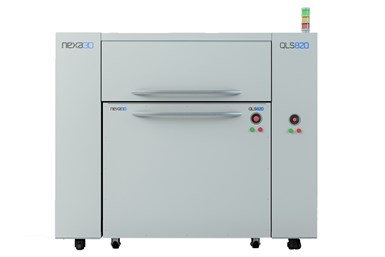Nexa3D QLS 820 High-Throughput Laser Sintering Platform
This high-throughput thermoplastic production system combines ultrafast printing with open materials and cloud-based software platform to deliver production volumes much greater than other powder-bed solutions on the market.
Share
Nexa3D’s QLS 820 is designed for high-volume production of thermoplastic components. Photo Credit: Nexa3D
Nexa3D, a maker of ultrafast professional and industrial polymer 3D printers, is now shipping its highest throughput additive production system, the QLS 820. The QLS 820 is designed for high-volume production of thermoplastic components. With a print speed of up to 8 L/hr. and up to 20% packing density, the company says it provides the highest throughput in its class.
It is said the QLS 820 represents a new class of powder bed technology that combines ultrafast printing with open materials and cloud-based software platform to deliver production volumes that are orders of magnitude greater than other powder-bed solutions on the market.
“My hat is off to our entire team of determined innovators, passionate engineers and experienced marketers for bringing to market an industry leading thermoplastic production platform that fully delivers on our ultrafast brand promise,” says Avi Reichental, Nexa3D co-founder and CEO.
At the core of the QLS 820 is the Quantum Laser Sintering (QLS) print engine consisting of four CO2 lasers with 100 W power, each enabling the ultrafast print speeds. The QLS 820 features an exchangeable build station that operators can use for continuous production during the cooldown process, thereby eliminating production bottlenecks and increasing both throughput and overall asset utilization.
The QLS 820 delivers a polymer-based production alternative to traditional injection molding without the design constraints, costly tooling investments and extended lead times. The platform works with standard materials such as PA11 and PA12 — direct replacements for injection molding grade materials — and is also compatible with higher temperature materials, such as PA6, at processing temperatures up to 240°C.
The first two units have been shipped to Quickparts and JawsTec, both high utilization users and providers of on-demand manufacturing services looking to improve the economics of additive production with higher yields and optimal machine performance. “We pride ourselves on offering quick turn manufacturing services to our customers and look forward to introducing an even faster and more efficient production of higher volume thermoplastic components with the QLS 820,” says Ziad Abou, Quickparts CEO.
- Learn about the expansion of Nexa3D’s resin portfolio with ceramic, flexible and clear materials resulting from the company’s collaboration with material experts at BASF and Henkel to validate custom formulations for its ultrafast fleet of industrial and desktop 3D printers.
- Read how Nexa3D can build 10,000+ shot molds in hours. In this sponsored content, the company explains how its polymer process can print a mold in hours that is prototype or production ready and can last for more than 10,000 shots.
Related Content
-
VulcanForms Is Forging a New Model for Large-Scale Production (and It's More Than 3D Printing)
The MIT spinout leverages proprietary high-power laser powder bed fusion alongside machining in the context of digitized, cost-effective and “maniacally focused” production.
-
This Drone Bird with 3D Printed Parts Mimics a Peregrine Falcon: The Cool Parts Show #66
The Drone Bird Company has developed aircraft that mimic birds of prey to scare off problem birds. The drones feature 3D printed fuselages made by Parts on Demand from ALM materials.
-
Video: 5" Diameter Navy Artillery Rounds Made Through Robot Directed Energy Deposition (DED) Instead of Forging
Big Metal Additive conceives additive manufacturing production factory making hundreds of Navy projectile housings per day.















